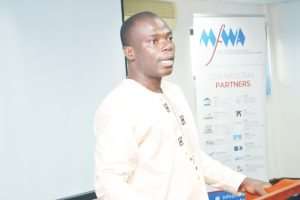
Media Foundation for West Africa (MFWA) has appealed to government not to totally shut down network access under any condition.
According to the civil society group, internet usage has become part of the Ghanaian society and urged the government to rather create a stronger monitoring mechanism to check the excesses.
The call was in reference to the then Inspector General of Police (IGP), Dr. John Kudalor's decision to shut down social media, prior to the 2016 elections, to prevent circulation of false news.
Mrs Dora B. Mawutor, the Programme Manager of Freedom of Expression Programme, MFWA, said the network and its usage have become an integral part of Ghanaian’s day-to-day life in the area of conducting business and social activities.
Mrs. Mawutor made the appeal at a workshop in Accra on cyber security issues in Ghana and network shutdowns in Africa.
Considering these, she explained that many livelihoods would be lost if government decides to embark on such a ‘fatal decision’.
She backed her argument by stating that services such as the internet, social media, mobile services, short message services (SMSs), voice over internet protocol service (Skype & Viber) and mobile money are some of the benefits the consumers are deriving from the internet.
Due to these benefits, she urged that government looks at instances that human rights would be protected and respected on the internet.
Though Ghana has signed on to the Universal Declaration on Human Rights (UDHR), which is not legally binding, she prayed that the country would hold on to the remit of the convention.
“Even though the UDHR is not a legally binding document, it has inspired a number of international, regional and national legal frameworks. Two of such legally binding instruments are the International Convention Economic, Social and Cultural Rights (ICESCR) and International Convention on Civil Political Right (CCRR).”
A cybercrime security analyst, Albert Antwi-Boasiako also used the occasion to call on government to put in place ‘Governance Structure’ that would oversee the activities of cyber security system of the country.
To achieve this, he said government should provide forensic laboratory that can help experts examine cybercrimes to protect both the state and the citizens.
The importance of ‘Governance Structure’ is to coordinate all stakeholders, where internet service would be provided under a one stop-shop system. He said, though, Ghana Cyber Policy has been proved, what is left to be envisaged is implementation.
Mr. Antwi-Boasiako further advised government to review cyber security agencies in order to bring them together under a standardized operation activity.
For instance, he questioned why government officials are operating state business with their private email addresses, saying, “People hire hackers to hack into other people’s emails…don’t be if parliamentarians’ emails are hacked.
“The government must protect its information because it is the state’s intellectual property.”
Following the current trends of cybercrimes and hate-speech on-going on the internet and other social media platform, Mr. Antwi-Bosiako observed that could cause a challenge to the country if not well curtailed.
He said Ghana's cybercrime has gained international attention, adding that ‘Sakawa’ is now a course being studied by global bodies.
The cybercrime security analyst cautioned government’s institutions against accepting gadgets like computers from foreign organisations.
By Bernice Bessey.




 We’ll no longer tolerate your empty, unwarranted attacks – TUC blasts Prof Adei
We’ll no longer tolerate your empty, unwarranted attacks – TUC blasts Prof Adei
 Bawumia donates GHc200,000 to support Madina fire victims
Bawumia donates GHc200,000 to support Madina fire victims
 IMF to disburse US$360million third tranche to Ghana without creditors MoU
IMF to disburse US$360million third tranche to Ghana without creditors MoU
 Truck owner share insights into train collision incident
Truck owner share insights into train collision incident
 Paramount chief of Bassare Traditional Area passes on
Paramount chief of Bassare Traditional Area passes on
 Two teachers in court over alleged illegal possession of BECE papers
Two teachers in court over alleged illegal possession of BECE papers
 Sunyani: Victim allegedly shot by traditional warriors appeals for justice
Sunyani: Victim allegedly shot by traditional warriors appeals for justice
 Mahama vows to scrap teacher licensure exams, review Free SHS policy
Mahama vows to scrap teacher licensure exams, review Free SHS policy
 Government will replace burnt Madina shops with a new three-story, 120-store fac...
Government will replace burnt Madina shops with a new three-story, 120-store fac...
